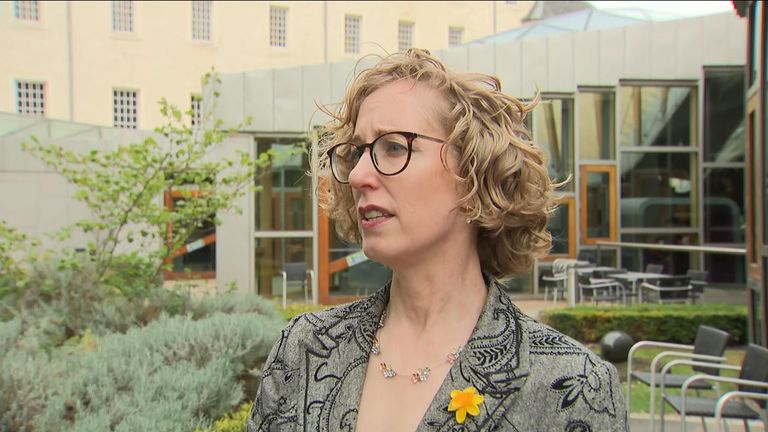News
Scottish Hospitals Are Almost Full, Says Nicola Sturgeon
January 9, 2023
April 30, 2024
What a week in politics - and it's only Tuesday.
It's the day after Humza Yousaf sensationally announced he was stepping down as Scotland's first minister and SNP leader after little more than a year in the hot seat.
It came as Mr Yousaf faced two votes of no confidence in the Scottish parliament following his decision to terminate the Bute House Agreement with the Scottish Greens.
Mr Yousaf intends to remain in the role until his successor is announced. The SNP is now accepting nominations, which will close at noon on Monday 6 May.
Last year's leadership contest to replace former first minister Nicola Sturgeon was bruising for the SNP with then candidates Mr Yousaf, Kate Forbes and Ash Regan trading blows during lively televised debates.
It appears that Ms Forbes is getting ready for round two with a source close to the former finance secretary telling Sky News she is "actively considering" entering the race again.
Meanwhile, John Swinney said he is giving "very careful consideration" to the prospect of throwing his hat into the ring.
Mr Swinney, who stepped down as deputy first minister when Ms Sturgeon resigned, seems to have secured the backing of several senior figures within the SNP, including the party's Westminster leader Stephen Flynn, education secretary Jenny Gilruth, health secretary Neil Gray, and MPs Pete Wishart, Ian Blackford and Alyn Smith.
On Tuesday morning, Scottish Tory leader Douglas Ross announced his party would no longer press ahead with the motion of no confidence in Mr Yousaf.
Mr Ross said: "I'm delighted that the Scottish Conservative motion of no confidence in Humza Yousaf achieved its purpose by forcing him to resign.
"While, on a personal level, I wish him well for the future, he was a disaster as first minister and it's in Scotland's interests that he goes.
"The next goal for my party is to see off this feuding, failing SNP government and switch the focus away from their independence obsession and on to the public's real priorities - such as growing the economy and improving Scotland's ailing public services.
"As it's job done in terms of Humza Yousaf, there's no longer any need for us to press ahead with a debate on our no-confidence motion.

Speaking earlier to Sky News, Scottish Greens co-leader Lorna Slater said there would be "no point" in continuing with the motion.
She said: "The first minister has said he is going to resign. It would be very petty of the Tories to press that. We would either abstain or vote in favour."
Meanwhile, the Scottish parliament will hold a no confidence debate and vote on the Scottish government on Wednesday.
Scottish Labour earlier confirmed it was pushing ahead with its motion as a "point of principle".
If the vote is successful, all Scottish ministers would be compelled to stand down, with parliament given 28 days to appoint a new first minister - failing which, a snap election would be called.
The Scottish Tories and Liberal Democrats back the motion, but the Scottish Greens do not and without their support Scottish Labour will not achieve the votes required.
MSP Gillian Mackay, Scottish Greens business manager, said: "Like the withdrawn Tory motion, the Labour one has clearly been overtaken by events.
"Pursuing it would achieve nothing and would simply mean more parliamentary game playing.
What happens now?
Motions of no confidence aside, it is expected that the leadership process will be similar to the one that followed Ms Sturgeon's resignation.
The SNP's national executive committee (NEC) decides the timeline for the leadership election. Nominations are now open and will close at noon on Monday 6 May.
Based on the rules that applied in 2023, candidates are required to get 100 nominations from at least 20 local party branches.
If more than one candidate meets that test, there will be a leadership contest.
The winner will then be decided by SNP members in a ballot using an alternative vote/single transferable vote system.
The next SNP leader would then need to seek parliamentary approval to succeed Mr Yousaf as first minister.
The parliament will have 28 days to nominate a replacement for Mr Yousaf once his resignation has been accepted by the King.
As the SNP are by far the largest party in Holyrood, the onus is on them to find a new leader who can work with other parties in a minority government.
The SNP's tally of 63 MSPs leaves them just short of a majority in the 129-member parliament, meaning politicians from other parties would need to be persuaded to either vote for an SNP candidate, or at least abstain in the ballot, for them to be successful.
The leaders from other political parties can also put themselves forward and MSPs can nominate a candidate, although it must be seconded by another member.
If that happens, any candidate that secures more than half of all votes will win the nomination.
If no one reaches that threshold, the candidate with the fewest votes will be eliminated - with the process repeated until the candidates are whittled down to two.
At that point, a candidate will only require a simple majority to win.
Whoever wins the vote is then formally appointed by the King.
However, if no new first minister can be selected within the 28 days, the Scottish parliament would be forced to hold a snap election.
Source: SKY NEWS
Image: The Guardian